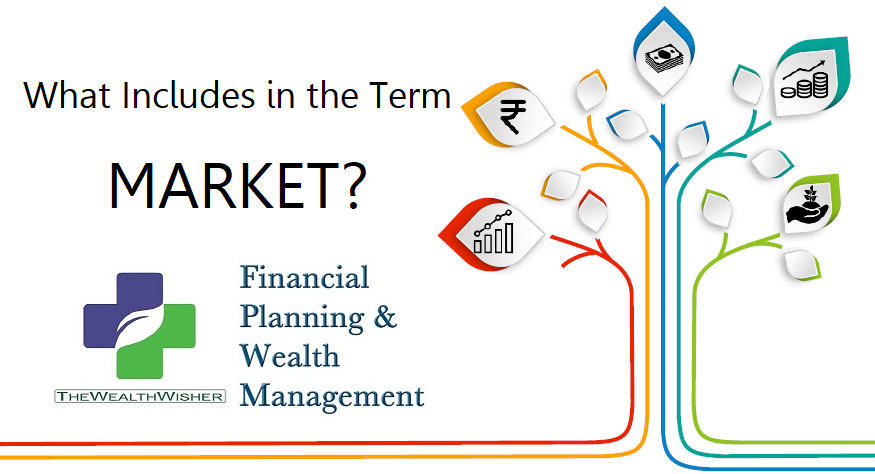The word market is used in Investment like a bundle of different market systems and sometimes the emotional aspects of it. Abhi market acha nahi hai … (market are not conducive for investment) or Market looks good! – It’s how one-liner people use when they talk about investments. What is market definition? What consists of a market? How to understand markets? Let’s make an attempt.
What is Market Today? – (Someone asking about Sensex or Nifty)
Markets not well nowadays! (Person is referring to the economy)
The market looks good in the long term. (Overall looks good time to invest)
So what does it means actually?
Market is a general term for Capital Market (Equity +Debt), Financial Market & Economy.

Let’s check what these are in brief.
What is Capital Market?
The Capital Market is a place for long-term loans (debentures & bonds) and equity capital. Companies and the government can raise funds for long-term investments via the capital market.
The capital market includes the stock market, bond market, and primary market. Thus, organized capital markets are able to guarantee sound investment opportunities.
Did you read this – Sutras of Portfolio Management
The capital market can be contrasted with other financial markets such as the money market which deals in short term liquid assets and futures markets which deal in commodities contracts.
What is Financial Market?
The financial markets which facilitates the raising of funds or the investment of assets, depending on viewpoint.
They also facilitate the handling of various risks. The financial markets can be divided into different subtypes:
- Stock, which facilitates equity investment and buying and selling of shares of stock.
- Bond, which provides financing through the issue of debt contracts and the buying and selling of bonds and debentures.
- Money, which provides short term debt financing and investment.
- Derivatives, which provides instruments for the handling of financial risks.
- Futures, which provide standardized contracts for trading assets at a forthcoming date.
- Insurance, which facilitates the handling of various risks.
- Foreign exchange, these markets can be either primary markets or aftermarkets.
What is Stock Market?
A stock market is for the trading of publicly held company stock and associated financial instruments (including stock options, convertibles and stock index futures).
Many years ago, worldwide, buyers and sellers were individual investors and businessmen. These days markets have generally become “institutionalized”; that is, buyers and sellers are largely institutions whether pension funds, insurance companies, mutual funds or banks.
This rise of the institutional investor has brought growing professionalism to all aspects of the markets.
Who are the main participants?
The framework consists of the following participants:
- Regulatory Institutions (e.g. SEBI to regulate)
- Stocks
- Market intermediaries, such as depositories, stock-brokers, and Mutual Funds.
- Investors
What are the different types of financial instruments?
The following are the different types of financial instruments:
- Debentures ● Bonds ● Preference shares
- Equity shares ● Government securities
How do I buy financial instruments as investment options?
One cannot buy directly from the market or stock exchange. A buyer has to buy stocks or equity through a Stock Broker, who is a registered authority to deal in equities of various companies. In effect, a lot many intermediaries might come in between the buyer and seller, as brokers do their business through many sub-brokers and the like.
Do you know SEBI has made intermediary to advise Individual Investors – These are Registered Individual Advisors – RIA. Click to Read About Them.
Economy
The economy or economics is very wide as it ranges from our country to what is happening in other parts of the world, it studies the trade between countries & the flow of money. It also studies the linkages between monsoon, crops, metals, various industries, interest rates & money supply.
It’s a vast field.
It is divided into MICRO & MACRO signals.
See how MACRO signals are performing related to India

Why am I telling you this?
There are 2 reasons why I am explaining to you what is market. These are:
- It is used in out of context situation. Means someone if says “Market is not right”… this may mean
- Economy is bad in the future so don’t invest.
- Equity markets are under performing, so invest at lower rates.
2. Market word is used in wrong situations.
Let me give you an example. If you visit a Real Estate businessman he would say the market is pretty bad because it reflects his work. It has no connection with overall economy.
Free Ebooks to Download & Free Calculators – Click Here
So you may not get what you are looking for. Similarly, a declining Auto Sales does not mean we are heading for a recession or doomsday.
A bad monsoon does not mean drought all over the country.
The economy is expressed in data points and data can be manipulated or misunderstood.
So now you know the full form of markets.
Send your queries in the below comments section and we will be happy to respond.










